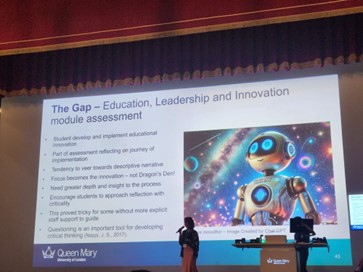The Festival of Education at Queen Mary (Day 2) held on 10 June provided a dynamic space for students and staff to come together and explore how the learning, assessment and feedback processes can be intentionally designed to benefit students, in some cases with the help of AI. The day’s programme combined fast-paced idea-sharing, deep pedagogical reflection, and a strong emphasis on student voice.
Lightning talks: from feedback portfolios to AI chatbots
The day began with a series of short lightning talks that captured diverse ways Queen Mary educators are rethinking learning design, assessment, and student agency. A key thread running through the session was the importance of co-creation, personalisation, and critical thinking.
In the talks, Tom Hinks (FMD) and Dr Keely Kulesza-Smith (FMD) shared their work on a co-designed AI chatbot that uses scaffolded questioning to support students in designing an innovation project. The tool encourages reflection and helps learners iterate on their thinking in a personalised, low-stakes environment. You can read more about this project in their article 'AI'm here to help', featured in our May newsletter which explores how AI-enabled digital dialogues can deepen learning in medical education.

Dr Jurgen Groet (FMD) introduced a student feedback portfolio, in which, instead of treating feedback as a one-off event, students are encouraged to actively collect and reflect on the feedback they receive across modules and years. This sustainable, student-led practice supports a strong sense of continuity and growth — especially important when developing reflective skills around professional practices.
In addition to the above lightning talks from FMD colleagues, the session also showcased a range of innovative assessment practices that prioritised authenticity, reflection, and student agency:
- Storytelling & Community Engagement — Students created portfolios based on storytelling from local community experiences, providing authentic evidence of real-world learning.
- STEM Assessment with Reflection — Students completed reflective writing tasks to connect discipline-specific knowledge with broader real-world applications, enabling them to transfer learning across interdisciplinary settings.
- Co-created Exam Question Bank — Students co-designed, trialled, and marked their own exam questions, fostering deeper learning and positioning them as active co-creators in the assessment process.
- AI Critique and Reflection — Students rewrote and critiqued AI-generated responses, using them as a basis for critical reflection and discussions around the limitations of generative AI.
Mini keynote series: Dialogue and partnership in AI-Enhanced education
Following the lightning talks, the focus shifted to a series of mini keynotes that offered deeper reflections on AI integration across teaching and learning. Among them was a presentation by who introduced a flexible framework to support academics in developing AI literacy through dialogue with students. The framework encourages educators to explore four key dimensions of generative AI with their learners: uses, impacts, opportunities for learning, and boundaries. Rather than offering prescriptive rules, it prompts open, context-sensitive conversations — both within modules and across disciplines — helping students understand where and how AI fits into their academic work, future careers, and broader societal contexts.
The presentation also highlighted a range of useful resources to support this work, including the Queen Mary Academic Misconduct Policy, Maha Bali’s “A possible trauma-informed approach to AI in the classroom”, and the University of Sydney’s “Menus, not traffic lights: A different way to think about AI and assessment”. By advocating for discussion over direction, the framework positions dialogue as a central tool in helping students make informed, ethical, and critically aware decisions about their use of generative AI.
Other speakers in the session included Dr Shabana Bharmal (FMD), who focused on the ethical and professional dimensions of AI in reflective medical education, and Dr Lilian Schofield (SBM) with student collaborator Rawand Shado, who presented on identifying pedagogical needs and co-creating solutions across faculties. Together, the talks presented a united vision for embedding AI in the curriculum in a pedagogically grounded, student-led, and ethical way.
Poster showcase: Strong FMD presence
In the afternoon, the Showcase and Share poster exhibition featured nearly 90 posters from across Queen Mary.
Among them was “Student perspectives on engagement in learning” by Dr Jo Elliott, Amina Bouhedda, Nora Hoffmann, and Dr Usman Naeem. This poster revealed how students define engagement, what motivates them, and how learner analytics can be better aligned with their lived experience.
Another key contribution was “Co-designing online MSc Cancer Biology” by Johnny Lee and Dr Luigi Ombrato (FMD). Centred on the CARE framework — Co-created, Active, Relational, Evidence-based — the poster detailed how asynchronous modules can deliver relational and reflective learning through multimedia, scenario-based games, and improvements based on student feedback.
The poster exhibition featured a strong contribution from FMD, with topics ranging from generative AI in clinical education and immersive dental training to reflection-based medical education and sustainable practice. These posters showcased innovative, evidence-informed approaches to teaching and learning across medical and dental programmes. You can view the full list of posters presented at the Festival of Education 2025.
Centre for Excellence in AI in Education
Throughout the day, from lightning talks to keynote dialogues and poster sessions, the Festival made clear that Queen Mary is approaching AI as a thoughtful implementation of its commitment to an inclusive, evidence-informed, and world-class student experience.
To learn more about Queen Mary’s initiatives in this area, hear from Shoshi Ish-Horowicz, Head of Innovation and Learning from Queen Mary Academy, on how the Centre for Excellence in AI in Education is supporting staff and students to engage critically and creatively with generative AI.